Wolves in Chernobyl have developed resistance to cancer/beccagtv
New research recently published sheds light on the unusual genetic adaptations of wolves living in the Chernobyl Exclusion Zone (CEZ).
The experts discovered that the Chernobyl wolves have genetic changes in the immune system and a certain level of resistance to cancer.
This discovery offers invaluable insights into the mechanisms of survival in one of the world's most hostile environments.
Since the infamous nuclear disaster that occurred in 1986, the area has been abandoned and according to reports, the wolf population there has increased 7 times more than in other parts of Ukraine.
The wildlife that took over the area, including the descendants of pet dogs left behind during the evacuation, has been studied by scientists for many years.
The researchers found that exposure to radiation increased the animals' chances of beating the cancer, 35 years after the disaster.
Cara Love, an evolutionary biologist at Princeton University, has been studying wolves for 10 years.
Her research found that their immune system was altered, similar to that of cancer patients undergoing radiation treatments.
Love presented her work at a meeting in Seattle, Washington, held last month.
She noted how "Chernobyl's wolves survive and thrive despite generations of exposure and accumulation of radioactive particles in their bodies."
She said: "The study showed that the packs of stray gray wolves living in Chernobyl developed mutations that increase their chances of surviving cancer."
Wolves roaming Chernobyl have developed some resistance to cancer/ShutterStock, wildlife_outdoor
In 2014, Love and her team visited the Chernobyl Exclusion Zone (CEZ) to take blood samples from the local wildlife.
They used special GPS collars to track the animals' movements and measure their radiation exposure.
Love emphasized the importance of access to them and stated: "We receive real-time measurements of where they are and how much radiation they are exposed to."
Their findings revealed that gray wolves were exposed to radiation levels 6 times higher than the safe limit for humans.
Furthermore, genetic analysis revealed unique mutations within the wolves' genomes, suggesting a form of natural selection favoring traits that contribute to cancer resistance.
with an exclusive discount
The Israeli company that invented hair removers does it again
In collaboration with Epilady
More on the subject:
Mutant dogs?
Chernobyl's dogs are genetically different from any other dog in the world
for the first time in the world: patients were treated with the new weapon to eliminate cancer tumors
"Chernobyl's wolves survive and thrive despite generations of exposure and accumulation of radioactive particles in their bodies"/ShutterStock, wildlife_outdoor
This study parallels previous observations made among the semi-feral dog population inhabiting the CEZ, emphasizing the evolutionary pressures imposed by the radioactive environment.
Lab's research, which identified parts of the wolf's genome that appeared to be resistant to increased cancer risk, encountered quite a few problems: the global corona epidemic and the ongoing conflict in the region prevented Lab and her colleagues from returning to the CEZ.
"Our priority is that the people and collaborators who are there be as safe as possible," Love stated.
The logistical challenges hindered further research efforts and left the fate of future investigations in limbo.
The DNA of animals living in the nuclear exclusion zone has intrigued scientists around the world.
Last year, Dr. Elaine Ostrander, a geneticist at the National Human Genome Research Institute and a research partner, suggested that this research could provide new ways to prevent cancer in humans and protect astronauts in space. Speaking to the Daily Telegraph, she said: "We still don't know what, if In general, genetic differences may allow dogs to survive in one environment versus another.
Searching for changes in DNA that helped one population over another to survive is the long-term goal of the research and the one we are working toward now."
Dr. Elaine added: "We had this golden opportunity to lay the foundation for an answer to a crucial question: 'How do you survive in a hostile environment? Such for 15 generations?'"
She also noted that the research "could help scientists design ideal protection for those who spend significant time in space."
More on the same topic:
Wolves
Chernobyl
Ukraine
cancer
Wolf

